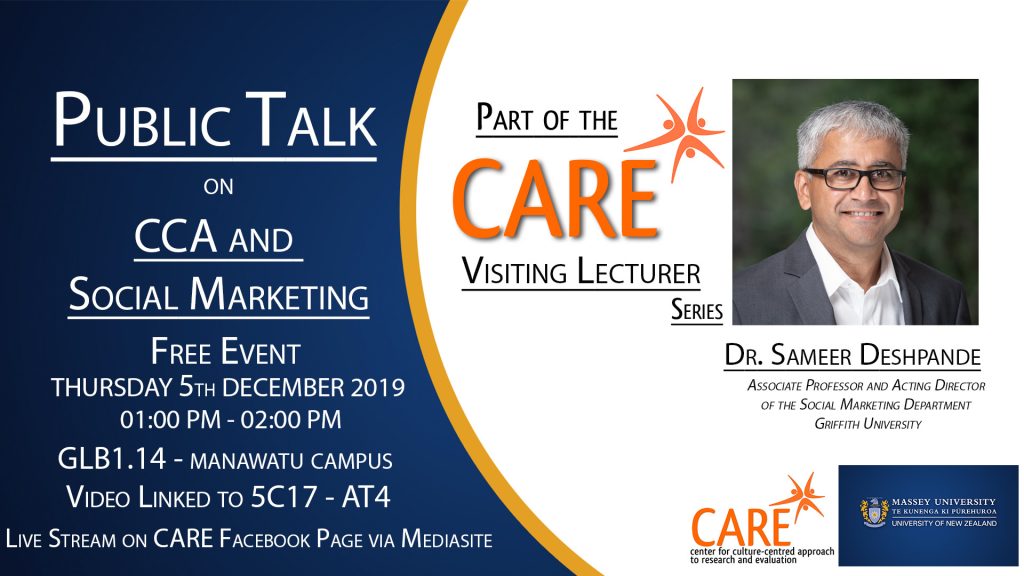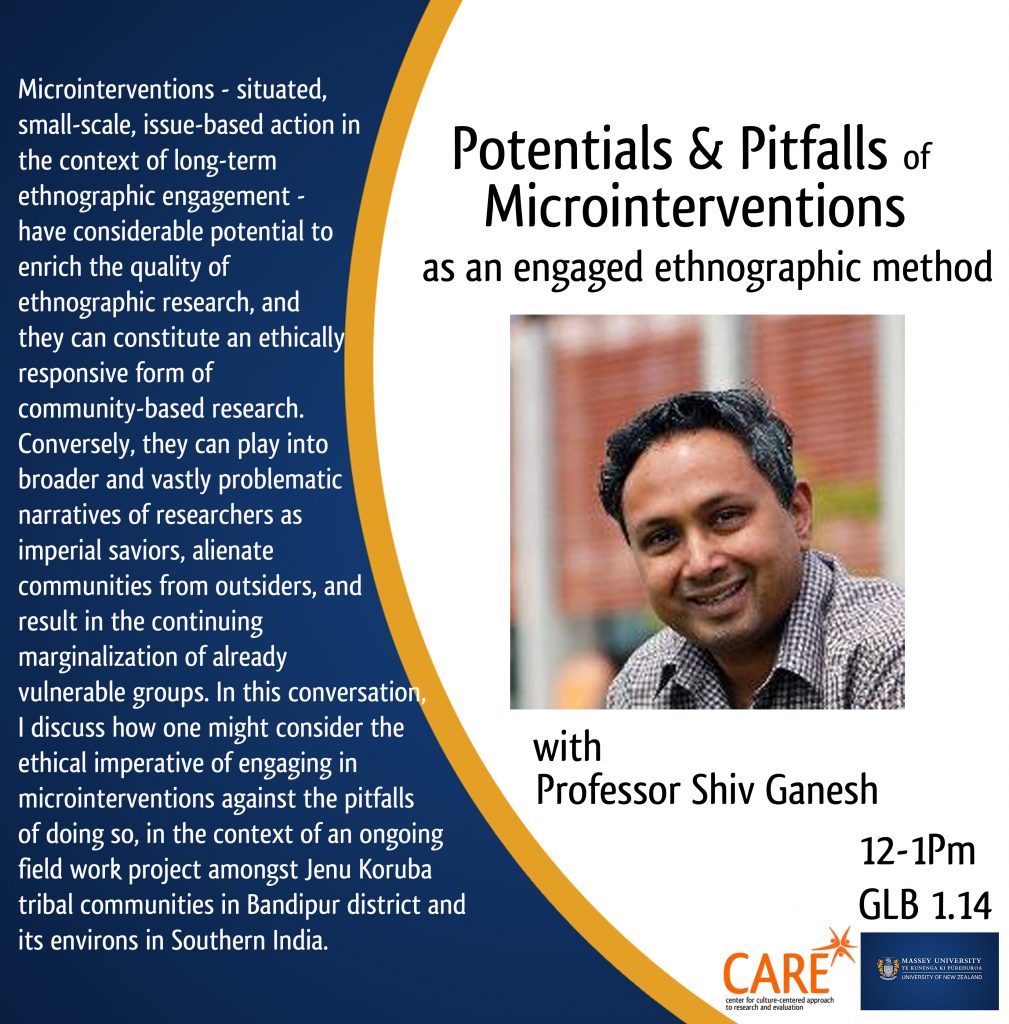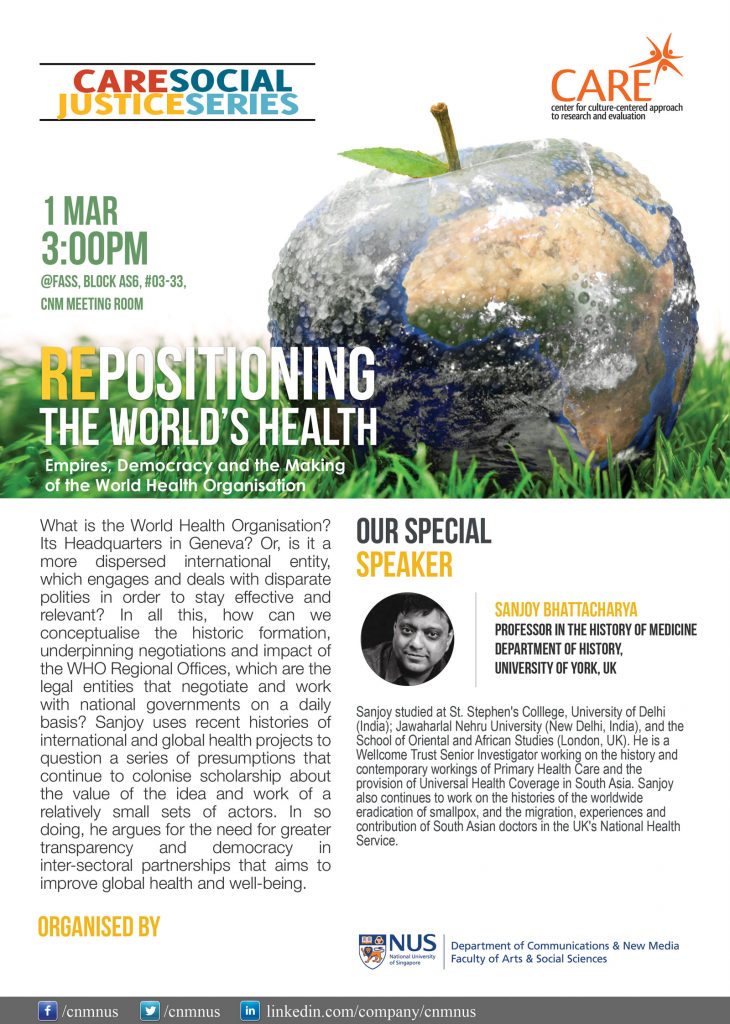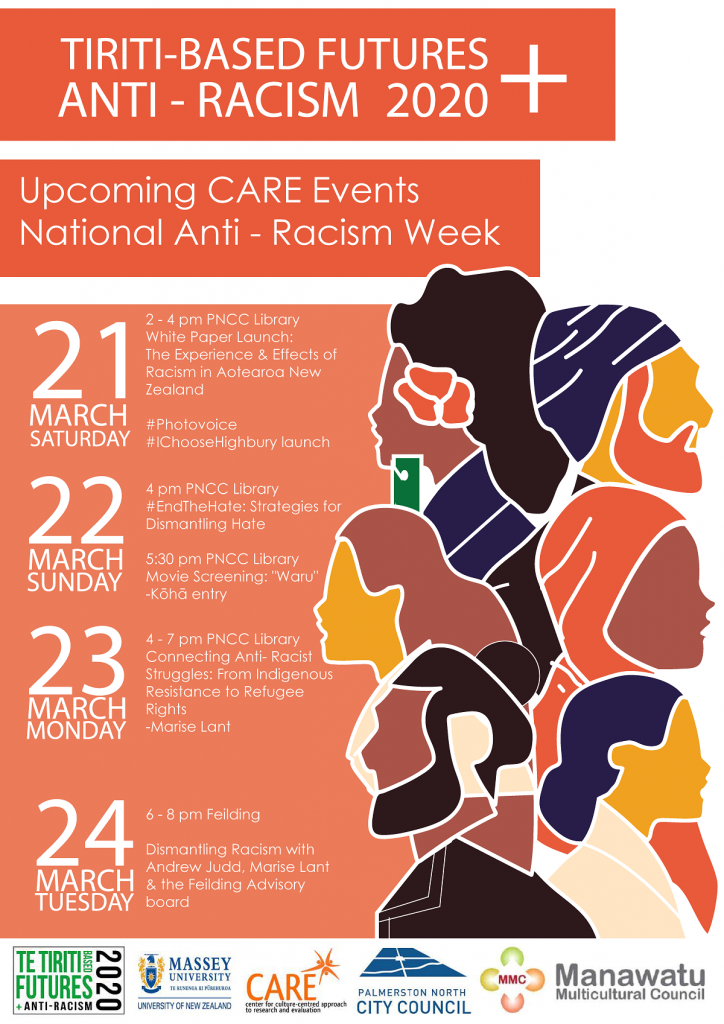
21-24 March 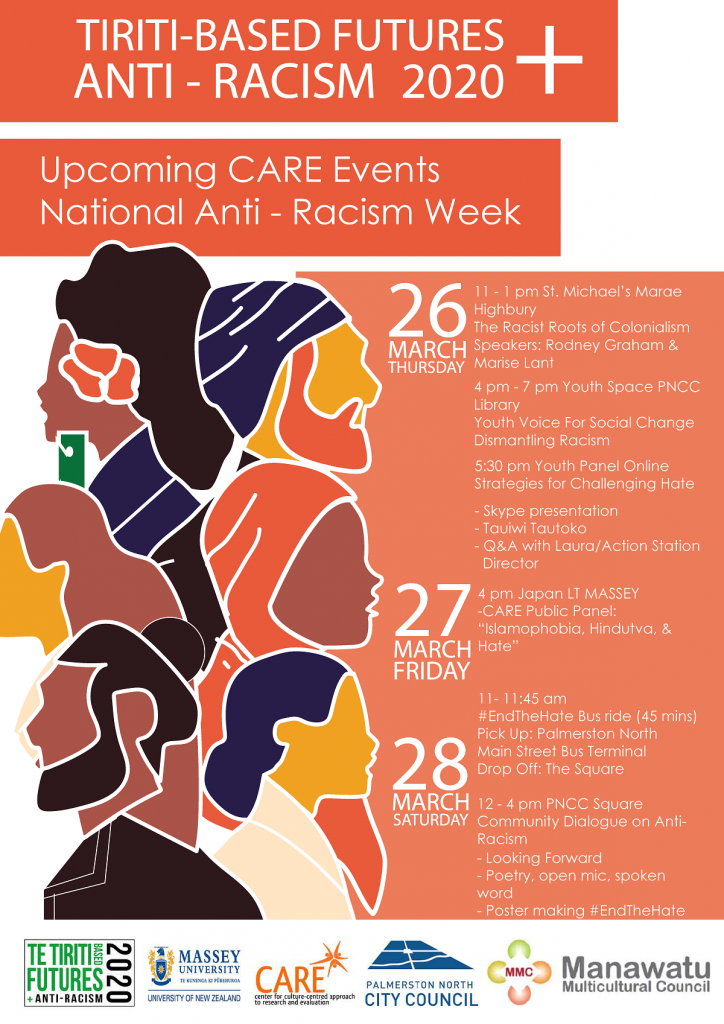
26-28 March
CARE Visiting Lecture -Public Talk – Dr. Laura Miller -University of Tennessee
Communicating about cancer: Considerations for identity and uncertainty management
Date: Thursday, 20 Feb 2020 Time: 12pm – 1pm
Location: BSC 1.06 CARE Lab, Manawatu campus. Massey University
RSVP: https://www.facebook.com/events/1526896230798430/
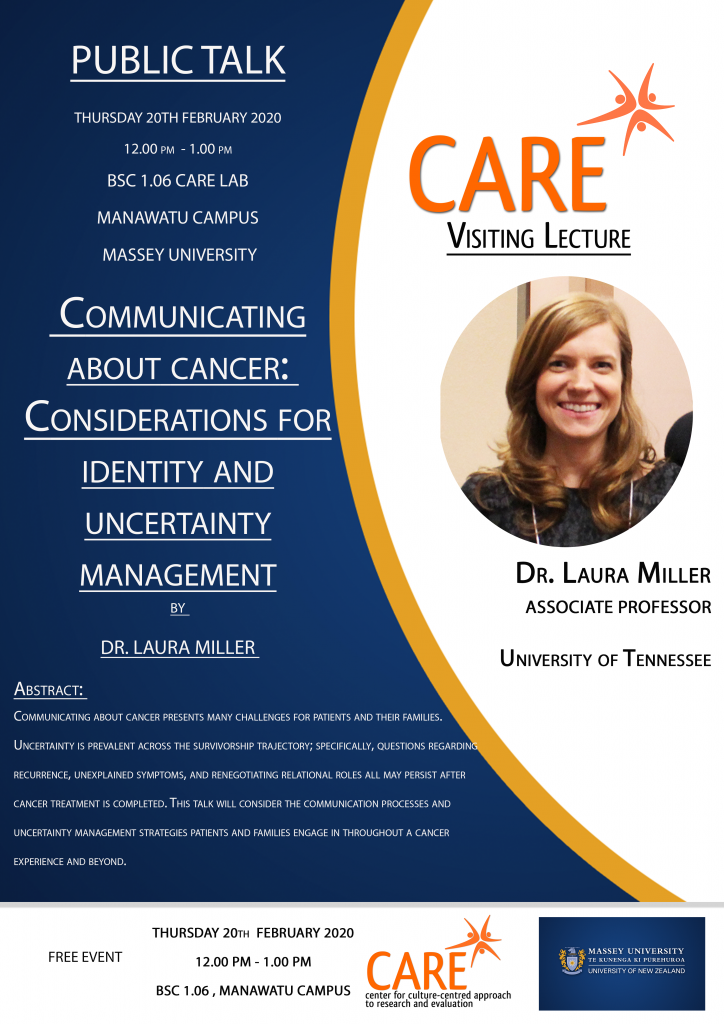
Talk Abstract:
Communicating about cancer presents many challenges for patients and their families. Uncertainty is prevalent across the survivorship trajectory; specifically, questions regarding recurrence, unexplained symptoms, and renegotiating relational roles all may persist after cancer treatment is completed. This talk will consider the communication processes and uncertainty management strategies patients and families engage in throughout a cancer experience and beyond.
Short Bio:
Laura Miller received her PhD from the University of Illinois at Urbana-Champaign. She is currently an Associate Professor in the School of Communication Studies at the University of Tennessee in the USA. Her works explores how individuals communicate about health, how families communicate support amid health stressors, and how illness-related uncertainty is managed. She is passionate about global education and has taught in Beijing, Dublin, and Sydney.
CARE Public Talk by Dr.Sameer Deshpande: CCA & Social Marketing- 5th Dec 2019- GLB1.14, Manawatu campus
| Speaker Bio:
Dr. Sameer Deshpande, PhD Dr. Deshpande is Associate Professor and Acting Director of the Social Marketing Department at Griffith University in Brisbane, Australia. Sameer teaches, trains, and conducts research in social marketing. He is the Editor of Social Marketing Quarterly. Over two decades, Sameer has raised over two million dollars and published studies testing effectiveness of social marketing framework with special emphasis on consumer-insights approach in a variety of contexts, including promotion of alternative rides, responsible drinking, alcohol abstinence during pregnancy, water rights, safe sexual practices, and physical activity. Sameer has widely published in academic journals, books, and conference proceedings. Prior to joining Griffith, Sameer offered services in the U.S., Canada, India, and Singapore. Dr. Sameer Deshpande Associate Professor (Social Marketing), Acting Director (Social Marketing @ Griffith) Department of Marketing, Griffith Business School, Griffith University Event: Registrations- https://www.facebook.com/events/1419311748220389/ Follow us on : Facebook :@CAREMassey – Youtube: @CAREMasseyNZ – Twitter: @CAREMasseyNZ |
CARE Public Talk by Prof. Shiv Ganesh from University of Texas at Austin
Prof. Shiv Ganesh, from University of Texas at Austin , will be presenting a talk at CARE: Center for Culture-Centered Approach to Research and Evaluation on –
Potentials and pitfalls of Microinterventions as an engaged ethnographic method
Monday 11,March 2019
12 noon – 1 pm
GLB1.14, Geography building, Manawatu Campus
Vided Linked to Auckland : AT4 & Wellington: 5C17
Mediasite live stream : https://webcast.massey.ac.nz/Mediasite/Play/4a2ab793db7d448eb2f327272542a2ad1d
Facebook: https://www.facebook.com/CAREMassey/videos/542751926233393/
Microinterventions—situated, small-scale, issue-based action in the context of long term ethnographic engagement—have considerable potential to enrich the quality of ethnographic research, and they can constitute an ethically responsive form of community-based research. Conversely, they can play into broader and vastly problematic narratives of researchers as imperial saviors, alienate communities from outsiders, and result in the continuing marginalization of already vulnerable groups. In this conversation, I discuss how one might consider the ethical imperative of engaging in microinterventions against the pitfalls of doing so, in the context of an ongoing field work project amongst Jenu Koruba tribal communities in Bandipur district and its environs in Southern India.
CNM-CARE Research Talk: The Bandung Doctrine On Decolonisation- By Professor Kuan-Hsing Chen
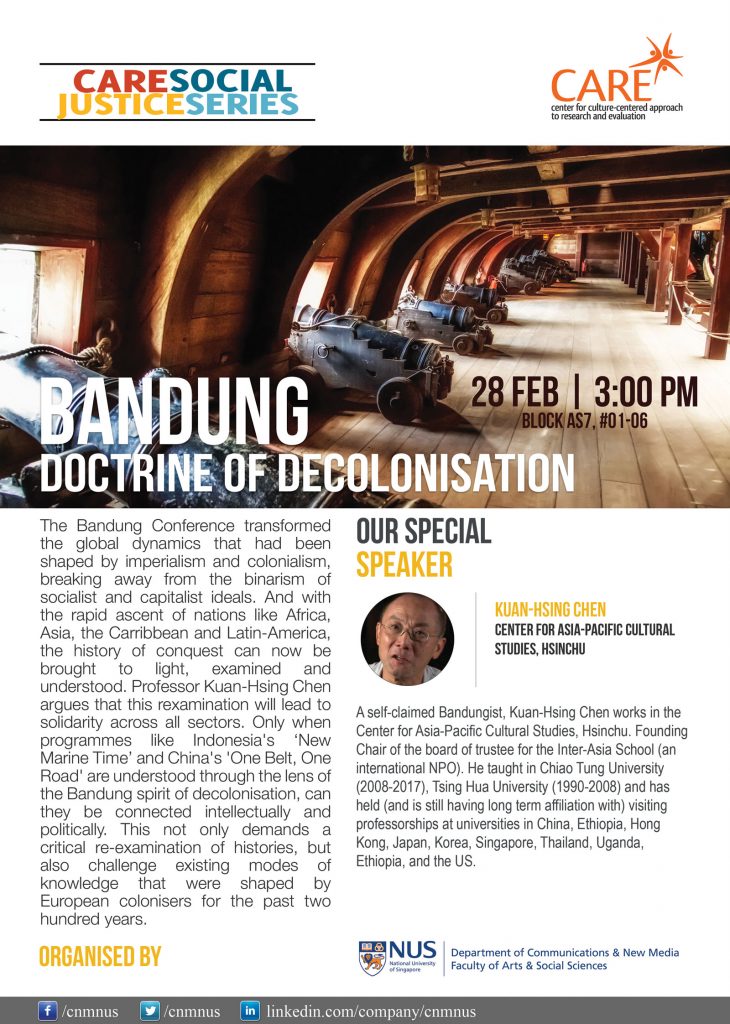
Abstract:
The Bandung Conference transformed the global dynamics that had been shaped by imperialism and colonialism, breaking away from the binarism of socialist and capitalist ideals. And with the rapid ascent of nations like Africa, Asia, the Carribbean and Latin-America, the history of conquest can now be brought to light, examined and understood. Professor Kuan-Hsing Chen argues that this re-examination will lead to solidarity across all sectors. Only when programmes like Indonesia’s New Marine Time and China’s One Belt, One Road are understood through the lens of the Bandung spirit of decolonisation, can they be connected intellectually and politically. This not only demands a critical re-examination of histories, but also challenge existing modes of knowledge that were shaped by European colonisers for the past two hundred years.
Speaker:
A self-claimed Bandungist, Kuan-Hsing Chen works in the Center for Asia-Pacific Cultural Studies, Hsinchu. Founding Chair of the board of trustee for the Inter-Asia School (an international NPO). He taught in Chiao Tung University (2008-2017), Tsing Hua University (1990-2008) and has held (and is still having long term affiliation with) visiting professorships at universities in China, Ethiopia, Hong Kong, Japan, Korea, Singapore, Thailand, Uganda, Ethiopia, and the US.
28 Feb 2018
3:00 PM – 4:00 PM
Faculty of Arts and Social Sciences
Block AS7, #01-06
Register at cnmn.us/bandung.
CNM-CARE Research Talk: Repositioning The World’s Health- By Professor Sanjoy Bhattacharya
Abstract:
What is the World Health Organisation? Its Headquarters in Geneva? Or, is it a more dispersed international entity, which engages and deals with disparate polities in order to stay effective and relevant? In all this, how can we conceptualise the historic formation, underpinning negotiations and impact of the WHO Regional Offices, which are the legal entities that negotiate and work with national governments on a daily basis? Professor Sanjoy Bhattacharya uses recent histories of international and global health projects to question a series of presumptions that continue to colonise scholarship about the value of the idea and work of a relatively small sets of actors. In so doing, he argues for the need for greater transparency and democracy in inter-sectoral partnerships that aims to improve global health and well-being.
Speaker:
Sanjoy Bhattacharya is Professor in the History of Medicine Department of History, University of York, UK. He studied at St. Stephen’s College, University of Delhi (India); Jawaharlal Nehru University (New Delhi, India), and the School of Oriental and African Studies (London, UK). He is a Wellcome Trust Senior Investigator working on the history and contemporary workings of Primary Health Care and the provision of Universal Health Coverage in South Asia. Sanjoy also continues to work on the histories of the worldwide eradication of smallpox, and the migration, experiences and contribution of South Asian doctors in the UK’s National Health Service.
1 March 2018
3:00 PM – 4:00 PM
VENUE CHANGED
Faculty of Arts and Social Sciences
Block AS6, Lecture Theatre 14 (LT14)
Faculty of Arts and Social Sciences
Block AS6, #03-33, CNM Meeting Room
Register at cnmn.us/who.
The Role of Indigenous Rights In Rainforest Preservation, Two Perspectives: Presented by Joe Lamb and Dr Jose Fragoso
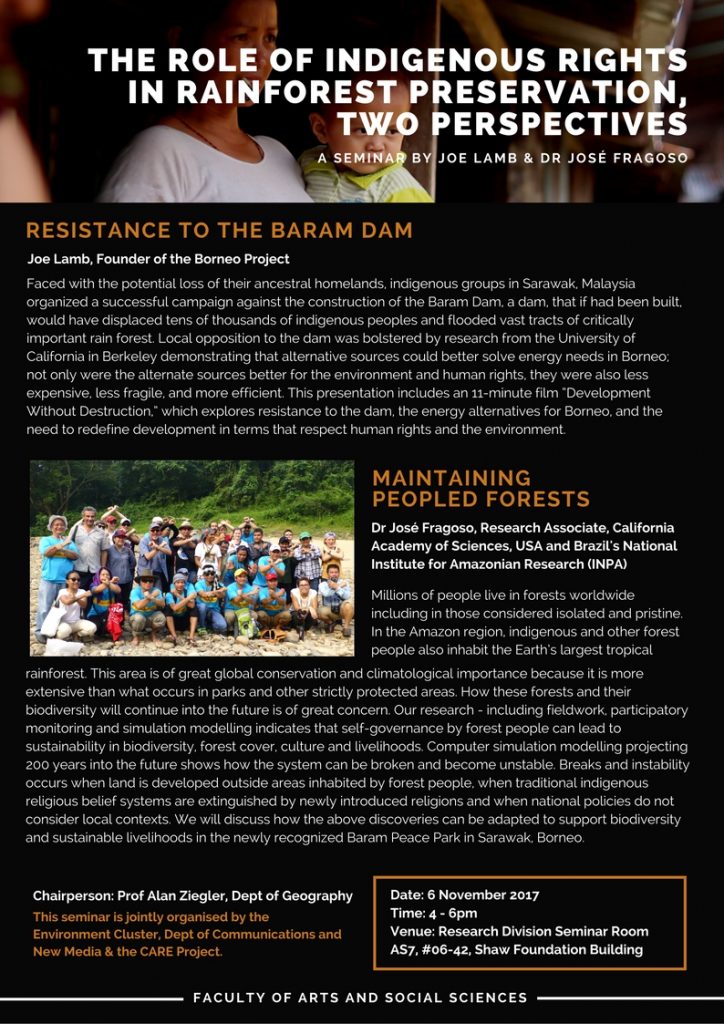
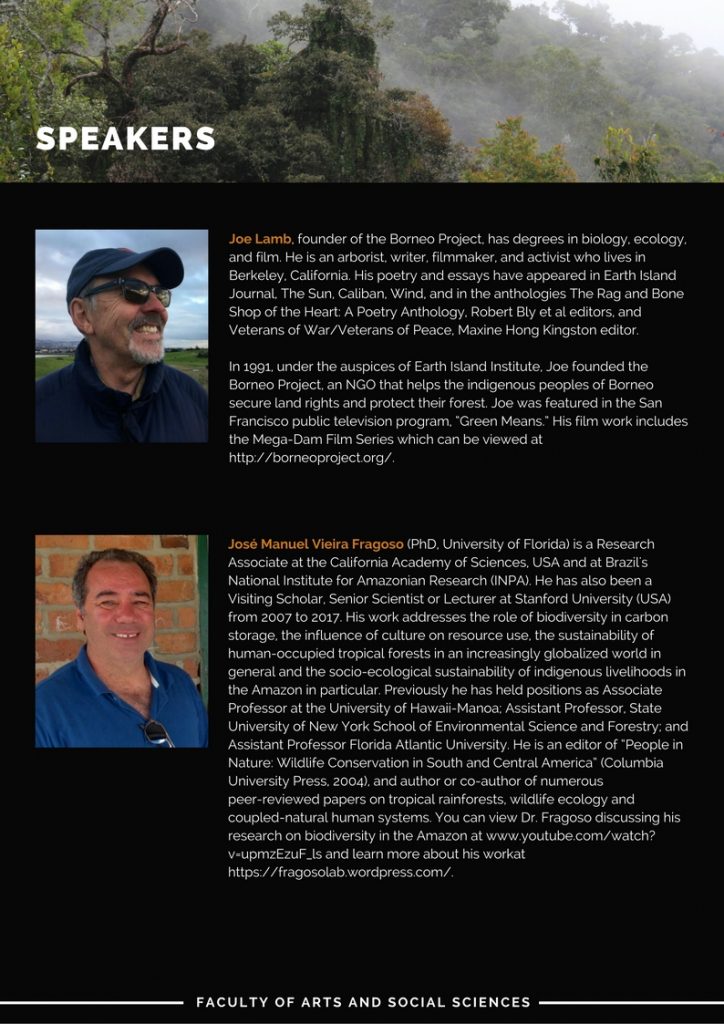 WHY YOU NEED TO ATTEND: Indigenous groups in Sarawak, Malaysia, when faced with a large-scale development project that would displace thousands of people, and destroy large swathes of rainforest, launched a successful campaign to stop the construction of the Baram Dam. Learn how the land’s natives worked together with researchers from the University of California to propose alternative sources of energy that would be less costly, less fragile, and more efficient. The collaboration remains an example of how research can not only redefine the foundations of development that respects both human rights and the environment, but also amplify the voices of communities.
WHY YOU NEED TO ATTEND: Indigenous groups in Sarawak, Malaysia, when faced with a large-scale development project that would displace thousands of people, and destroy large swathes of rainforest, launched a successful campaign to stop the construction of the Baram Dam. Learn how the land’s natives worked together with researchers from the University of California to propose alternative sources of energy that would be less costly, less fragile, and more efficient. The collaboration remains an example of how research can not only redefine the foundations of development that respects both human rights and the environment, but also amplify the voices of communities.
Date: 6 November 2017
Time: 4:00 PM – 6:00 PM
Venue: Research Division Seminar Room, Block AS7, #06-42, Shaw Foundation Building
Digital Storytelling Methods: A Workshop by Professor Jeff Peterson
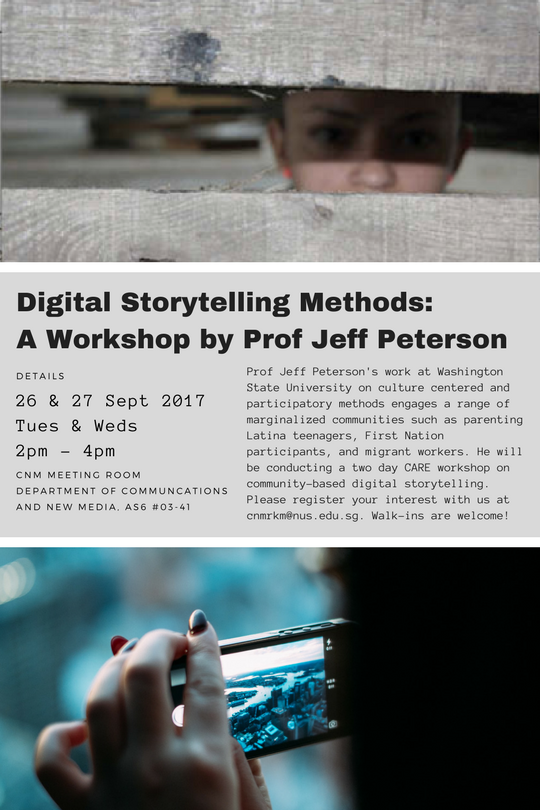 26 – 27 September 2017
26 – 27 September 2017
2:00 PM – 4:00 PM
Faculty of Arts & Social Sciences
National University of Singapore
Department of Communications and New Media
Blk AS6, #03-41
CNM Meeting Room
[2 Talks and A Workshop] Dr Shaunak Sastry and Dr Zhuo Ban
We are excited to have Dr Shaunak Sastry and Dr Zhuo Ban with us this week and we would like invite you to their talks and workshop. Please see the details of the speakers, talks and workshop below. See you there!
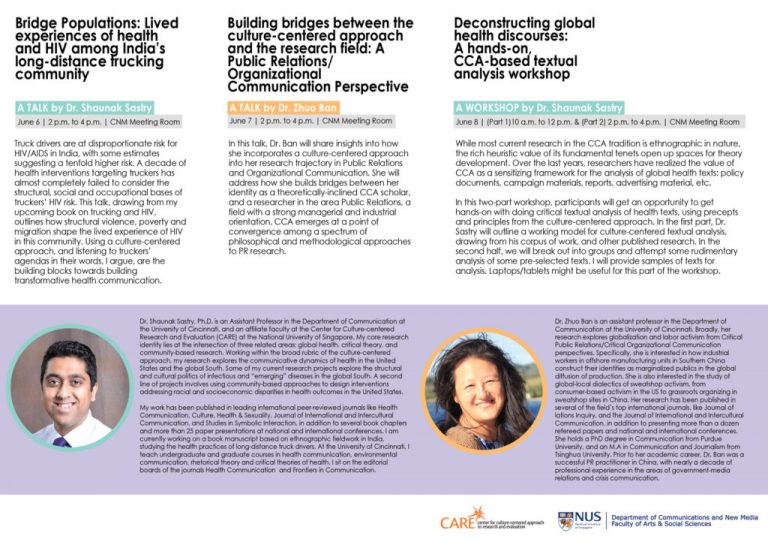
[FEBRUARY TALKS] Dr Binod C Agrawal and Dr Tejaswini Niranjana
Last month, CARE invited Dr Binod Agrawal and Dr Tejaswini Niranjana to give a talk on their research they have done in India. Dr Binod shared with us his research on how satellite communication technology has performed and developed in India while Dr Tejaswini presented her research on the process of becoming a woman in India in the age of globalisation. You can watch the recordings of both talks below. Enjoy!
[12 FEBRUARY] DR BINOD C AGRAWAL PROMISES AND PERFORMANCES OF SATELLITE COMMUNICATION TECHNOLOGY FOR DEVELOPMENT IN INDIA
[24 FEBRUARY] DR TEJASWINI NIRANJANA THE REORGANISATION OF DESIRE: CULTURAL LIVES OF YOUNG WOMEN IN GLOBALISING INDIA

